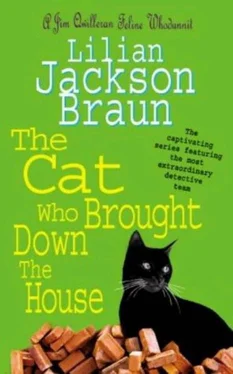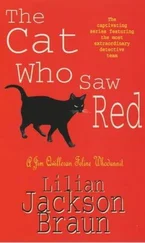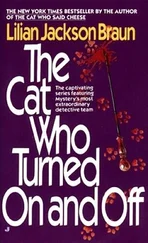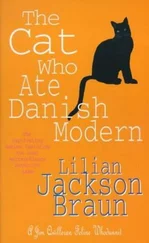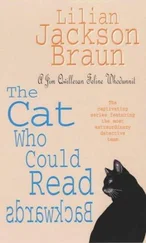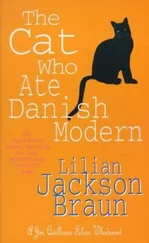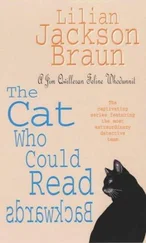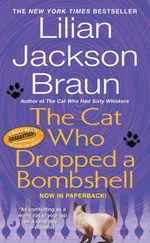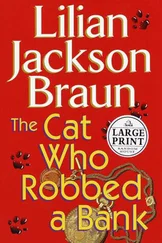Lilian Braun - The Cat Who Brought Down the House
Здесь есть возможность читать онлайн «Lilian Braun - The Cat Who Brought Down the House» весь текст электронной книги совершенно бесплатно (целиком полную версию без сокращений). В некоторых случаях можно слушать аудио, скачать через торрент в формате fb2 и присутствует краткое содержание. Год выпуска: 2003, ISBN: 2003, Издательство: Jove, Жанр: Старинная литература, на английском языке. Описание произведения, (предисловие) а так же отзывы посетителей доступны на портале библиотеки ЛибКат.
- Название:The Cat Who Brought Down the House
- Автор:
- Издательство:Jove
- Жанр:
- Год:2003
- ISBN:9780515136555
- Рейтинг книги:4 / 5. Голосов: 1
-
Избранное:Добавить в избранное
- Отзывы:
-
Ваша оценка:
- 80
- 1
- 2
- 3
- 4
- 5
The Cat Who Brought Down the House: краткое содержание, описание и аннотация
Предлагаем к чтению аннотацию, описание, краткое содержание или предисловие (зависит от того, что написал сам автор книги «The Cat Who Brought Down the House»). Если вы не нашли необходимую информацию о книге — напишите в комментариях, мы постараемся отыскать её.
The Cat Who Brought Down the House — читать онлайн бесплатно полную книгу (весь текст) целиком
Ниже представлен текст книги, разбитый по страницам. Система сохранения места последней прочитанной страницы, позволяет с удобством читать онлайн бесплатно книгу «The Cat Who Brought Down the House», без необходимости каждый раз заново искать на чём Вы остановились. Поставьте закладку, и сможете в любой момент перейти на страницу, на которой закончили чтение.
Интервал:
Закладка:
The Cat Who Brought Down the House
Lilian Jackson Braun
Chapter 1
Who was Thelma Thackeray?
It was April first, and it sounded like an April Fool’s joke.
Had anyone by that name ever lived in Moose County, 400 miles north of everywhere?
Yet, there it was, in black and white—in the newsbite column of the Moose County Something:
RETURN OF THE NATIVE
Thelma Thackeray, 82, a native of Moose County, has retired after a 55-year career in Hollywood, CA, and is returning to her native soil. “I'm coming home to die,” she said cheerfully, “but not right away. First I want to have some fun.”
It was followed by less startling items: The sheriff had purchased a stop-stick to aid deputies in high-speed car chases... The Downtown Beautiful committee had decided on hot-pink petunias for the flower boxes on Main Street... The sow that escaped from a truck on Sandpit Road had been discovered in the basement of the Black Creek Elementary School.
Immediately the lead item was being discussed all over town, via the grapevine. In coffeehouses, on street corners, and over backyard fences the news was spread: “A Hollywood star is coming to live in Pickax!”
Jim Qwilleran, columnist for the newspaper, was working at home when his phone started ringing. “Who was Thelma Thackeray?... Was she really a movie star?... Did the press know more than they were telling?”
“It sounds like a hoax,” he told them. He remembered the April Fool’s prank that his fellow staffers had played on the Lockmaster Ledger a year ago. They phoned a tip that a Triple Crown winner was being retired to a stud farm in Lockmaster under terms of absolute secrecy. Reporters at the Ledger had spent a week trying to confirm it.
Nevertheless, Qwilleran’s curiosity was aroused. He phoned Junior Goodwinter, the young managing editor, and said sternly, “What was the source of the Thelma Thackeray newsbite?”
“She phoned our night desk herself—from California. Why do you ask? Do you have a problem with that?”
“I certainly do! The name sounds phony! And her remark about dying and having fun is too glib for a person of her apparent age.”
“So what are you telling me, Qwill?”
“I'm telling you it’s a practical joke played by those guys in Lockmaster in retaliation for the horse hoax. Have you been getting any reader reaction?”
“Sure have! Our phones have been ringing off the hook! And—hey, Qwill! Maybe there really is a Thelma Thackeray!”
“Want to bet?” Qwilleran grumbled as he hung up.
Qwilleran had a sudden urge for a piece of Lois Inchpot’s apple pie, and he walked to the shabby downtown eatery where one could always find comfort food at comfortable prices—and the latest gossip. Lois herself was a buxom, bossy, hardworking woman who had the undying loyalty of her customers. They took up a collection when she needed a new coffeemaker and volunteered their services when the lunchroom walls needed painting.
When Qwilleran arrived, the place was empty, chairs were upended on tables, and Lois was sweeping up before dinner. “Too early for dinner! Too late for coffee!” she bellowed.
“Where’s your busboy, Lois?”
Her son, Lenny, usually helped her prepare for dinner.
“Job hunting! He finished two years at MCCC, and he’d really like to go to one of them universities Down Below, but they’re too expensive. So he’s job hunting.”
Qwilleran said, “Tell Lenny to apply to the K Fund for a scholarship. I'll vouch for him.” The young man had faced personal tragedy, a frame-up, and betrayal of trust –with pluck and perseverance.
With a sudden change of heart she said, “What kind of pie do you want?”
“Apple,” he said, “and give me that broom and I'll finish sweeping while you brew the coffee.”
The middle-aged man pushing the broom and righting the chairs would have been recognized anywhere in three counties as James Mackintosh Qwilleran. He had a pepper-and-salt moustache of magnificent proportions, and his photo appeared at the head of the ‘Qwill Pen’ column every Tuesday and Friday. He had been a highly regarded journalist in major cities around the country; then he inherited the vast Klingenschoen fortune based in Moose County and he relocated in the north country. Furthermore, for reasons of his own, he had turned the inheritance over to a philanthropic institution. The Klingenschoen Foundation, popularly called the K Fund, was masterminded by experts in Chicago, where Qwilleran was recognized as the richest man in the northeast central United States. Around Pickax he was Mr Q.
Eventually Lois returned from the kitchen, carrying two orders of apple pie and a coffee server; forks, napkins, and mugs were in her apron pockets. They sat in a booth near the kitchen pass-through, so she could shout reminders to the woman who cooked dinner. Lois herself would wait on tables, take the money, and serve as moderator of the free-for-all talk show carried on among the tables.
“Well, Mr Q,” she began, “you missed a good chinfest this afternoon. Everybody’s excited about the movie star comin’ to town. Do you think she’ll come in here to eat?”
Still suspecting a Lockmaster trick, he replied evasively, “Just because she’s lived in Hollywood for fifty years, it doesn’t make her a movie star. She could be a bookkeeper or policewoman or bank president.”
Whatever she is, he thought, she must be loaded—to buy a house on Pleasant Street.
Lois shouted at the pass-through, “Effie! Don’t forget to thaw the cranberry sauce!... Funny thing, though, Mr Q—nobody remembers a Thackeray family in these parts.”
Facetiously he said, “It would be interesting to know if she’s related to William Makepeace Thackeray.”
“Don’t know anybody of that name. Who is he?”
“A writer, but he hasn’t done anything recently.”
She yelled, “And, Effie! Throw some garlic powder in the mashed potatoes!”
Qwilleran said, “Sounds delicious. I'd like to take a turkey dinner home in a box.”
Lois yelled, “Effie! Fix a box for Mr Q—and put in some dark meat for his kitties.”
“By the way,” he said, “what’s all the action in the next block? All those trucks coming and going.”
“They’re movin’ out!” she said. “Good riddance! It don’t make sense to have a place like that downtown.”
He waited for his ‘box’ and walked to the corner of Church and Pine streets, where large cartons were being loaded into trucks and carted away. According to the logos on the cartons they were refrigerators, washers and dryers, kitchen ranges, and television sets.
He said to the man directing the loading, “Either you’re moving out, or you’ve sold a lot of appliances this week.”
“We got a new building on Sandpit Road—steel barn with real loading dock. Plenty of room for trucks”
The edifice they were vacating was a huge stone hulk, wedged between storefronts of more recent vintage. That meant it was more than a century old, dating back to the days when the county’s quarries were going full blast and Pickax was being built as the City of Stone. It was the first time he had scrutinized it. There were no windows in the side walls, and the front entrance had been boarded up. Qwilleran crossed the street and appreciated the design for the first time: Four columns were part of the architecture, topped by a pediment and the simple words inscribed in the stone: OPERA HOUSE.
Then he realized that the smaller buildings on either side had been vacated also. Something was happening in downtown Pickax!
Qwilleran went home to his converted apple barn, which was as old as the opera house. It occupied a wooded area on the outskirts of town—octagonal, forty feet high, with fieldstone foundation and weathered wood shingles for siding. As he drove into the barnyard two alert cats were watching excitedly in the kitchen window. They were sleek Siamese with pale fawn bodies and seal-brown masks and ears, long slender legs, and whiplike tails. And they had startlingly blue eyes.
Читать дальшеИнтервал:
Закладка:
Похожие книги на «The Cat Who Brought Down the House»
Представляем Вашему вниманию похожие книги на «The Cat Who Brought Down the House» списком для выбора. Мы отобрали схожую по названию и смыслу литературу в надежде предоставить читателям больше вариантов отыскать новые, интересные, ещё непрочитанные произведения.
Обсуждение, отзывы о книге «The Cat Who Brought Down the House» и просто собственные мнения читателей. Оставьте ваши комментарии, напишите, что Вы думаете о произведении, его смысле или главных героях. Укажите что конкретно понравилось, а что нет, и почему Вы так считаете.
